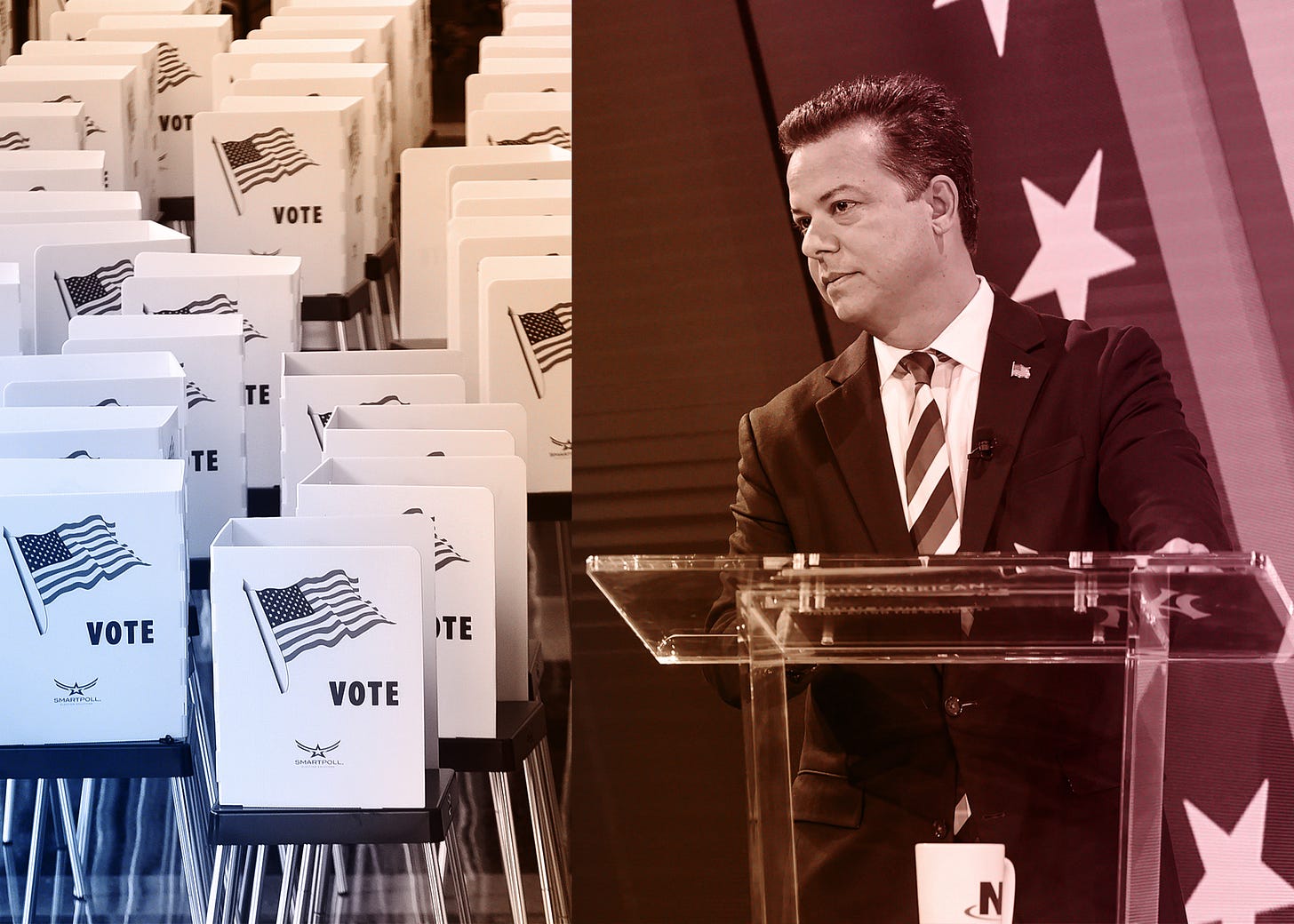
What I Saw on the Campaign Trail
Democrats had achievements to run on. But we were overwhelmed by a variety of factors.

I HAD A DIFFERENT PERSPECTIVE ON the 2024 election than I did on the past few I’ve covered as a journalist—because this time, I was the candidate for Congress.
Running for a seat in New York’s first district, I found that what I learned by listening to voters did not track with the subjects that preoccupy most horse-race political coverage. Instead, people out on Eastern Long Island were focused on issues like the price of food and affordability (from inflation to housing and insurance costs).
There was also an underlying fear of civic disorder, expressed through concern about crime and the fentanyl crisis; the assault on reproductive rights and broken borders; and the threats to social order ranging from Donald Trump’s election denialism to the rise of identity politics.
But the biggest driver of voter frustration was the middle-class squeeze that has been going on for decades and is getting worse. Voters sense that families and small businesses that work hard and play by the rules can no longer get ahead in a system that seems rigged to benefit billionaires and big corporations. This doesn’t translate to flashy TV packages or clickbait headlines, but it is the grinding fact of most folks’ daily lives.
That’s why the core message of my campaign was a commitment to “rebuild the middle”—both the middle of our politics and the middle of our economy. These things are directly connected. It’s not a coincidence that the middle of our politics has been hollowed out at the same time that the middle of our economy has been hollowed out. Until we rebuild a strong middle class, our politics won’t have the ballast needed to steady the increasingly intense partisan swings.
The irony is that Democrats ran on this. Joe Biden consistently warned about the dangers of the middle-class squeeze since it accelerated during the Reagan era, when American manufacturing began moving overseas. He was more of a pro-union president than any other occupant of the White House in recent memory.
And while no one wants to hear this right now, President Biden’s record also included landmark legislation that over time—if it is not repealed out of partisan spite—will do a lot to rebuild the middle class through the re-shoring of essential manufacturing and through historic infrastructure spending. While inflation spiked early on his watch, America’s economy is “the envy of the world” in the words of the Economist.
But President Biden was hobbled by legitimate perceptions of reduced vigor while Democrats were denied credit for the bipartisan legislation they passed during his presidency. At stops at diners while on the campaign trail, I noticed that Biden’s age was a punch-line offered up by kids while their parents offered a pox-on-both-houses assessment of the two parties, often mentioning things like defund-the-police. There was pervasive anger at Albany for bail-reform laws, despite the fact that violent crime has fallen under Biden.
Talking with those voters, I was often reminded of one of my favorite quotes from the late New York Senator Daniel Patrick Moynihan: “Everyone is entitled to their own opinion, but not their own facts.” The results of this election show that collective reasoning around common facts in hopes of finding common ground is an increasingly rare quality.
I was struck by the prevalence of misinformation but also the relentlessness of the right-wing media ecosystem. There was willful amnesia over Trump’s botched COVID response, dismissal of election denialism and the January 6th attack, a demonization of Ukraine aid, and outright hostility to facts about America’s economic recovery and the re-shoring of essential manufacturing under Biden.
The network of influencers and social media accounts, compounded by what remains of right-wing talk radio and cable news, would drive a message that was repeated loudly by true believers in ways that reached the ears of less politically-active voters. This prevalence overwhelmed the influence of less partisan legacy media, which proved susceptible to getting pulled toward a fake fairness out of concern over seeming biased.
Hardcore Trump supporters often come to political debates armed with a catechism of alternative facts. There is remarkable message discipline that comes from repetition—arguing, for instance, about the alleged failures of the bipartisan border security bill Trump killed, rather than acknowledging what conservative Oklahoma Senator James Langford said about the bill’s virtues and substance. There is a pervasive impulse to defend whatever Trump does, even when it requires reversing previous positions or common sense standards. This loyalty-over-logic impulse revealed itself in a televised debate when my opponent—a sitting congressman—couldn’t even bring himself to criticize Donald Trump for praising Adolf Hitler.
DEMOCRATS, OF COURSE, HAVE THEIR own reckoning to confront in the aftermath of this election.
The first lesson I took from my campaign is the most fundamental one from the Clinton-Carville school of politics: It really is the economy, stupid. This is a matter of perception as well as reality. Democrats need to fully embrace an agenda that focuses on rebuilding the middle class, which will require restoring the state and local tax deduction, expanding the child tax credit, and reducing bureaucratic red tape on small businesses. Notably, Kamala Harris proposed tax incentives for starting a new business and a $25k first-time home-owner loan, but this did not reach as many people as Trump’s anti-trans ad, which was in regular rotation even in New York area broadcasts.
To regain trust, we need to be strong on security and safety, beginning with border security as a down-payment on comprehensive immigration reform, and we must re-implement effective quality of life policing strategies. If people don’t feel safe and economically secure, all other issues fade to the background.
Democrats also need to stop getting spun around the axle of culture war debates that are amplified by right-wing media. Democrats often get stuck on defense because they tip-toe around issues for fear of offending someone, somewhere, when there should be a higher degree of common sense and moral clarity. One surefire way to do this is to stand up against illiberalism on the far-right and the far-left. That means denouncing campus protests that turn violent and standing up against any form of group blame—especially antisemitism—that often comes as a side order with identity politics. Democrats need to be reformers who police our own extremes. Especially in the face of Trump’s impulse to praise autocrats, Democrats should lean into the contrast by reaffirming that we stand with our fellow democracies and against tyrants and terrorists.
There were times on the campaign trail that reaffirmed my belief that we can rebuild trust and bipartisan coalitions by listening combined with a straight talk that doesn’t ignore community frustrations. One such moment was when I received the congressional endorsement of the Coram Civic Association—in a conservative part of the district—even as they endorsed Trump for president. A key part of the reason given that I was middle of the road and responsive to community issues. Given the opportunity for an open conversation, I found that the idea of supporting “the person not the party” endures.
We could use more moral humility in politics and a genuine attempt to understand as well as to be understood.
Though I lost my campaign in the red wave, I did leave the race believing that such appeals could work. Many of the Trump supporters I spoke to said they genuinely wanted to find ways to reunite our community and our country, even if they had a very different perspective on the prime drivers of this division and dysfunction. In addition, I found that one of the most enthusiastic responses from Democratic audiences came when I argued we need to celebrate patriotism and reclaim the American flag because it belongs to all of us.
So despite the unwelcome results of this election and the dark days I believe are ahead for our country, I emerged with a surprising degree of faith and hope in the durability of the American experiment. While I do believe there may be dark days ahead, I also believe the pendulum will swing back because we are not quite as divided as our politics sometimes makes it seem. Spending the past year on the campaign trail didn’t just make me a better candidate. It made me a better citizen.
John Avlon is an author, journalist, former CNN anchor and most recently a candidate for Congress in New York’s first district. His books include Washington’s Farewell, Wingnuts and Lincoln & the Fight for Peace.
















